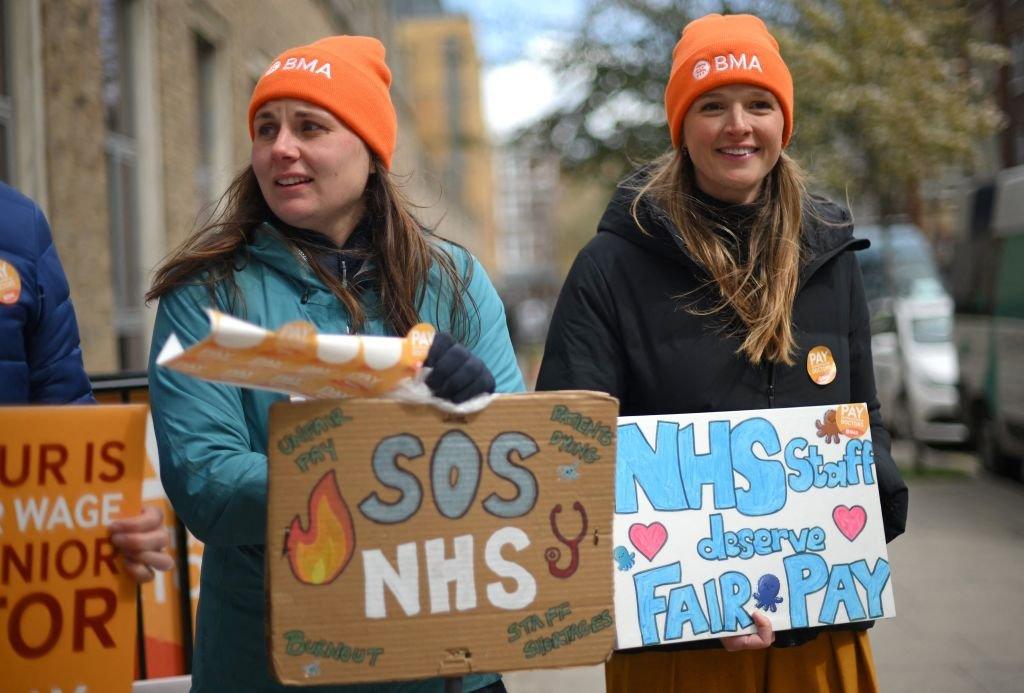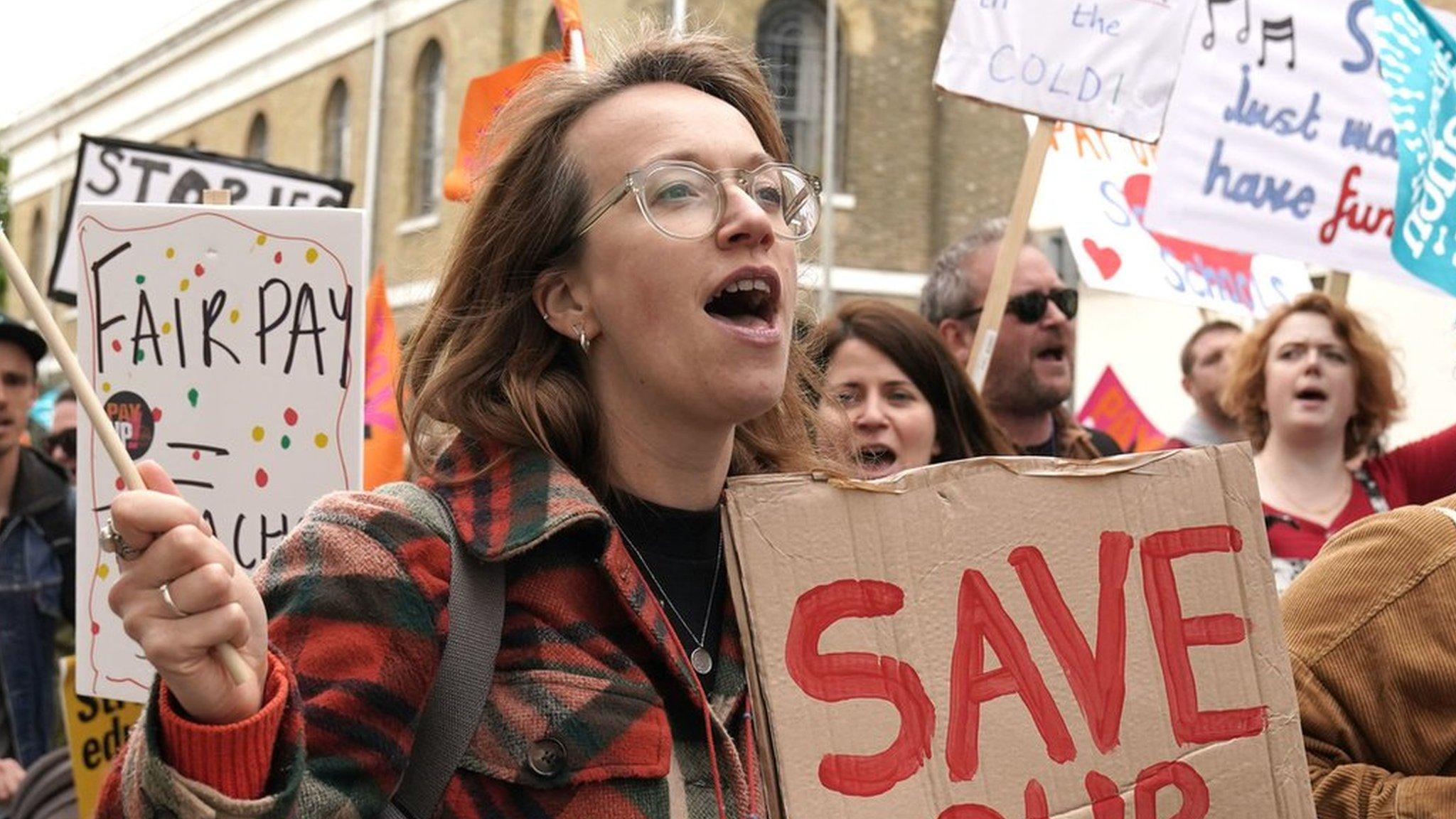Strike dates: Who is striking and what pay do they want?
- Published

Hundreds of thousands of workers have been taking part in strikes over pay.
However, some agreements have been reached, including a pay settlement for teachers.
Who is allowed to strike?
Trade Unions have organised industrial action for workers doing many different jobs. Some rules - like giving enough notice - must be met. And there are additional rules for certain sectors.
Police and prison officers are not currently allowed to strike.
The government is trying to introduce a law that will require some trade union members to work during a strike, to provide a minimum level of service.
Who has been taking industrial action?
Teachers
No further teachers strikes are currently planned
Members of the National Education Union (NEU) in England have taken action on eight days since February - forcing many schools to close
The four unions involved in the dispute, including the NEU, have all now accepted a pay rise of 6.5% for most teachers next year
The unions had been calling for extra government funding to ensure any pay rises did not come from schools' existing budgets
Both sides in the dispute said the 6.5% offer is "properly funded"
In Northern Ireland, five teaching unions went on strike on 26 April, and action short of a strike continues
The dispute has been resolved in Scotland
Some head teachers in Wales continue to take action short of a strike
Read more: When and where are teachers striking?
Tube staff
Unions on the London Underground are in a long-running dispute about pensions, job cuts and working conditions
However, a planned strike from 23 July until 28 July was called off following progress in talks, and no new strikes are currently planned
Despite this, the RMT has warned the dispute is not yet over and the union has a mandate to call strikes until October
Read more: Week of disruption to hit services, RMT says
Doctors
Junior doctors will strike from 07:00 BST on Friday 11 August to on 07:00 on Tuesday 15 August.
Senior doctors - consultants - will strike on 24 and 25 August
The British Medical Association has asked for a 35% pay rise for junior doctors to make up for below-inflation wage rises for the past 15 years, but the government has said is "unreasonable in the current economic context"
The government is giving doctors a 6% pay rise this year with junior doctors getting an additional £1,250 - that works out as an average of nearly 9%
Junior doctors in Scotland suspended their strike action in July after the government offered a total pay increase of 17.5% over two years
Read more: Senior doctors announce more walkouts
Rail workers
No strikes are currently scheduled, although the RMT and Aslef unions have held a series of walkouts over the past year
The Aslef train drivers' union is holding a week-long overtime ban from 31 July to 5 August, and another overtime ban will take place from 7 to 12 August
The RMT held three one-day strikes in July, and could continue to call more strikes until November, when it would have to re-ballot its members
A separate dispute involving RMT members and Network Rail was resolved after union members accepted a revised pay deal
The unions are in dispute with the government and rail companies about pay, job cuts and changes to terms and conditions
Rail industry bosses say changes need to be made, to modernise the railway and to make pay increases affordable
Nurses
Members of the Royal College of Nursing union in England will not continue their strike action after too few of them took part in their latest strike ballot
A majority supported strike action but trade union laws mean that more than 50% of members need to vote
Nurses in England are included in a deal, reached on 2 May, offering a 5% pay rise and a one-off payment of at least £1,655
A majority of unions accepted the offer
Nurses across nearly all parts of Wales have suspended action planned on 12 and 13 July
In Scotland, union members have accepted an offer worth an average 6.5% for 2023-24
Read more: What is the new NHS pay offer?
Ambulance workers
Ambulance workers are included in the pay deal for NHS staff in England announced on 2 May
Unite - one of three unions threatening to continue action - has a mandate for further strikes in some ambulance services
Read more: Unions split on NHS pay deal offer
Passport Office staff
There are no strikes currently planned by Passport Office staff.
Read more: Passport delay warning as five-week strike called
Civil servants
Public and Commercial Services (PCS) says at the moment there are no planned strikes by civil servant union members
The Prospect union, which has more than 32,000 civil service members, paused planned strike action after the government offered to engage in "meaningful talks" over pay
Read more: Civil servants call off planned strike
University staff
No further strikes are scheduled but some students have not been able to graduate this summer because of a marking boycott by staff, affecting exams and assessments
Members of the University and College Union (UCU) have been on strike at 150 universities across the UK on several dates this academic year
The boycott is part of action short of a strike in a dispute about pay and working conditions
In April, the union renewed its mandate for industrial action for another six months

Watch Make Sense of Strikes on iPlayer and find out more about why people are striking and whether industrial action works.

Have any disputes been resolved?
Some workers have settled disputes:
Heathrow airport security staff accepted a pay offer worth between 15.5% and 17.5%
Criminal barristers in England and Wales accepted a 15% pay rise in October
About 2,000 Arriva bus drivers in London won an 11% pay deal
A series of strikes involving 1,800 bus drivers in London employed by Abellio ended after the workers accepted a "greatly improved" pay offer
Some BT workers agreed a pay deal worth up to 16%
Health workers who are members of Unite and Unison in Scotland - including some paramedics, nurses, midwives and support staff - accepted a 7.5% pay deal in December
Does the public support strike action?
Public support for strike action has remained consistent since the start of 2023 but varies between different industries, polling carried out by YouGov suggests.
For example, in July it found more than three in five people (61%) supported the nurses' strike - with ambulance workers backed by a similar number. However, support is lower (38%) for university staff strikes.
- Published31 July 2023
